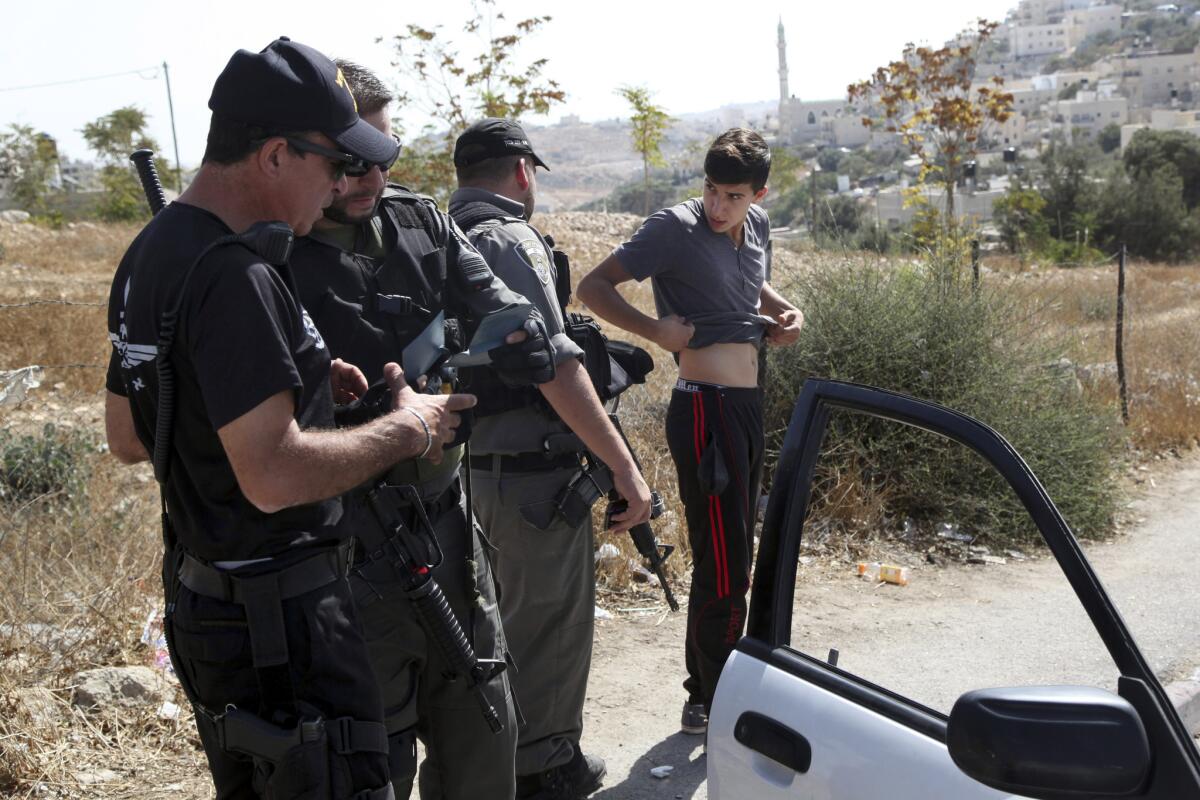Israel sends soldiers into cities to bolster security

Israeli border police search a man as he leaves the Palestinian neighborhood of Jabal Mukaber in Jerusalem on Wednesday.
- Share via
Reporting from Jerusalem — Spurred by weeks of bloodshed, Israel on Wednesday announced the rare deployment of soldiers alongside police in cities across the country, set up checkpoints in some neighborhoods in traditionally Arab east Jerusalem and pressed ahead with plans to punish the families of Palestinian attackers.
Human rights groups and Palestinian officials swiftly condemned the measures, announced Wednesday after a late-night meeting of Prime Minister Benjamin Netanyahu and top security officials. Additional security consultations were taking place during the day.
International concern has been growing over the wave of violence in Israel and the Palestinian territories in which seven Israelis and some 30 Palestinians have died. Dozens more have been injured. Secretary of State John F. Kerry said he would soon travel to the region in an effort to help ease tensions.
See the most-read stories this hour >>
The unrest has been driven in part by Palestinians’ fury over what they see as Israeli efforts to gain greater Jewish prayer access to a site in Jerusalem’s Old City that is sacred to both Jews and Muslims. Israel denies it is seeking to change a decades-old agreement governing the raised plateau that Muslims consider their third-holiest site and Jews revere as the Temple Mount.
Last summer’s bloody war in the Gaza Strip also lit a long-burning fuse of resentment and anger, coupled with frustration over the breakdown of the peace process and Jewish settlement activity in east Jerusalem and the West Bank, the heartland of any future Palestinian state.
The bulk of the attacks over the past month have been stabbings, most often carried out by young Palestinian men, and security forces and bystanders alike have been quick to respond.
Two more such confrontations took place Wednesday in Jerusalem. Officials said a Palestinian man was shot to death after he pulled a knife when approached by paramilitary border police. Later, an attacker stabbed a 70-year-old woman waiting for a bus, police said. The victim’s wounds were not serious, and the assailant was “neutralized,” according to a police statement.
During the ongoing wave of unrest, assailants have used cars to ram into Israelis, and on Tuesday briefly seized control of a city bus and attacked passengers, killing two.
The new security steps, the toughest such measures in more than a decade, call for the revocation of residency rights of Palestinians found to have been involved in “terrorism,” and allow for not only the demolition of family homes of those who carry out attacks but appropriation of the land to prevent them from rebuilding. Another measure would prevent the return of slain assailants’ bodies to their families.
Because a preponderance of the attacks have been carried out by Palestinians from east Jerusalem, there have been calls from some Israeli politicians to lock down those areas. Sealing off all of east Jerusalem is impractical because its neighborhoods are closely intertwined with predominantly Jewish ones, but the new measures already were impeding movement.
At the entrances to some Palestinian enclaves, police carried out identity checks and in some cases body searches of people leaving. Traveling between one Palestinian area of the city and another on Wednesday, motorists going in opposite directions rolled down their windows and asked each other in Arabic: “Is it open?”
NEWSLETTER: Get the day’s top headlines from Times Editor Davan Maharaj >>
Human rights groups protested the restrictions.
“Imagine the New York Police Department putting police checkpoints outside minority neighborhoods, requiring residents to undergo inspection before entering white areas of the city, with the stated goal of stopping criminal attacks,” said Sari Bashi, the country director for Human Rights Watch. “Even when grappling with a surge in violence, law-enforcement authorities must avoid collective measures against an entire group of people.”
Sobelman is a special correspondent.
Twitter: @laurakingLAT
ALSO
Palestinian-Israeli violence raises talk of a new intifada
Israelis call up more police officers amid continued violence
Knife assaults on Israelis continue wave of violence in Jerusalem
More to Read
Sign up for Essential California
The most important California stories and recommendations in your inbox every morning.
You may occasionally receive promotional content from the Los Angeles Times.













